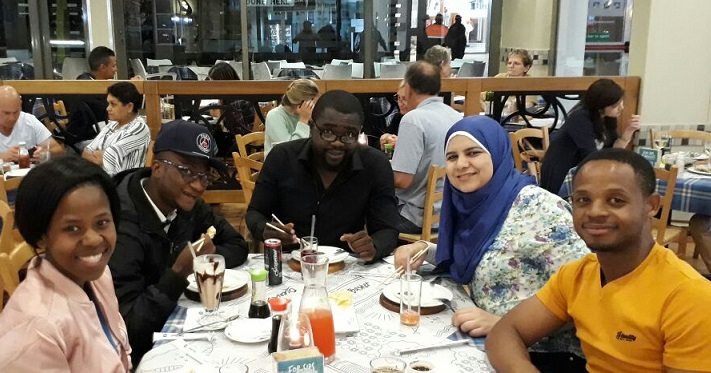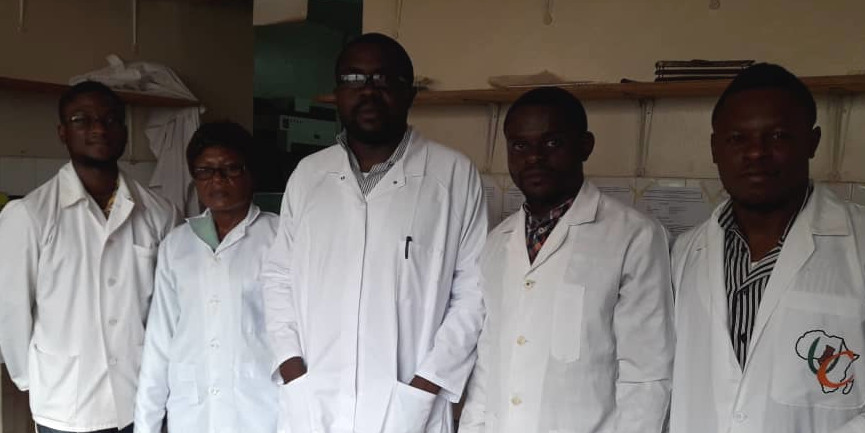Group leader: Justin Komguep Nono

Justin Komguep Nono
Phone Number: +27 21 406 6035
Office Address: Wernher & Beit Bldg South S1.21
The Immunobiology of Helminths’ group is a newly established group within the Division of Immunology. The group focuses on the interactions between vertebrate hosts and helminth parasites, a group of parasites that affects and cause suffering in at least a billion of humans worldwide.
Particularly we seek to:
- Map risk factors of helminth burdens and associated disabilities in poor communities so as to better inform current control strategies.
- Identify and characterise host regulators of helminth transmission and morbidity so as to design host-directed therapies.
- Understand the complex interplay between helminths and memory immune responses in the context of vaccination so as to provide strategies that incorporate the potential influence or lack of influence of these parasites during vaccination campaigns.
- Understand the tripartite interaction between helminth infections with their associated tissue pathology, the host factors and the microbiome for a host/microbiome-incorporating design of intervention strategies during helminth infections.
- Identify helminth-derived host modulators that could inform better ways to mitigate untoward responses that drive disease.
Our research may be informative in the development of anti-helminth vaccines, novel anthelminthic drugs, public health policies and in identifying helminth-derived therapeutics that could help alter negative host responses.
Our group makes use of available clinical sites in West Africa (Cameroon) where helminth endemic areas are mapped for prevalence and morbidity. Murine models of transgenic mice are used in the South African laboratory for in-depth mechanistic assays involving various immunological assays, next generation sequencing, SNPs typing by MassARRAY, microbiome studies and in vitro cellular assays.
Funding:
The Helminth Immunobiology group has received past and present funds from the European Union via the European & Developing Countries Clinical Trials Partnership (EDCTP2) programme through grant TMA2016CDF-1571, the UK Royal Society and the African Academy of Sciences, the Merck Global Health Institute, the International Centre for Genetic Engineering and Biotechnology (CRP/CMR15-05) and the Poliomyelitis Research Foundation.
Collaborations:
Africa
- Prof Frank Brombacher, UCT, South Africa (Mouse models)
- Dr Mamadou Kaba, UCT, South Africa (Microbiome studies)
- Dr Emilson Chimusa, UCT, South Africa (Next generation sequencing)
- Prof Colonel Roger Somo-Moyou, Ministry of Scientific Research, Cameroon (Clinical Schistosomiasis)
- Dr Palmer Masumbe, University of Yaoundé 1, Cameroon (Clinical parasitoses)
- Prof Veronique Penlap Mbeng, University of Yaoundé 1, Cameroon (Clinical microbiology)
- Dr. Alim Oumarou, Minsante, Cameroon (Ultrasonography)
America
- Prof Henrique Ferreira, Universidade Federal do Rio Grande do sul, Brazil (Helminth/Host Proteomics)
Europe
- Prof Manfred B Lutz, University of Würzburg, Germany (Immunotherapeutics)
- Prof Klaus Brehm, University of Würzburg, Germany (Tapeworm research)

Immunobiology of Helminth Infections - UCT Team

Immunobiology of Helminth Infections - Clinical Team, Cameroon
Justin Komguep Nono - Google Scholar
Recent publications:
- Nono JK*, Severin Donald Kamdem, Palmer Masumbe Netongo, Smritee Dabee, Michael Schomaker, Alim Oumarou, Frank Brombacher and Roger Moyou-Somo*. Schistosomiasis burden and its association with lower measles vaccine responses in schoolchildren from rural Cameroon. Frontiers in Immunology, 09 October 2018 | https://doi.org/10.3389/fimmu.2018.02295 *Correspondence
- Nono JK, Hlumani Ndlovu, Nada AbdelAziz, Thabo Mpotje, Lerato Hlaka and Frank Brombacher*. Host regulation of liver fibroproliferative pathology during experimental schistosomiasis via interleukin-4 receptor alpha. PLoS Neglected Tropical Diseases. 2017 Aug 21;11(8):e0005861.
- Nono JK, Hlumani Ndlovu, Nada AbdelAziz, Thabo Mpotje, Lerato Hlaka and Frank Brombacher*. Interleukin-4 Receptor Alpha is still required after Th2 polarization for the maintenance and the recall of protective immunity to Nematode infection. PLoS Neglected Tropical Diseases. 2017 Jun 26;11(6):e0005675.
- Hurdayal R, Ndlovu HH, Revaz-Breton M, Parihar SP, Nono JK, Govender M, and Frank Brombacher*. IL-4-producing B cells regulate T helper cell dichotomy in type 1- and type 2- controlled diseases. Proc Natl Acad Sci U S A. 2017 Sep 15. doi: 10.1073/pnas.1708125114.
- Emilia Vendelova, Jeferson Camargo de Lima , Karina Rodrigues Lorenzatto, Karina Mariante Monteiro , Thomas Mueller, Jyotishman Veepaschit, Clemens Grimm, Klaus Brehm, Gabriela HrÄková, Manfred B. Lutz, Henrique B. Ferreira*, Nono JK*. Proteomic analysis of excretory-secretory products of Mesocestoides corti metacestodes reveals potential suppressors of dendritic cell functions. PLoS Neglected Tropical Diseases. 2016 Oct 13 ; 10(10):e0005061. * correspondence
- Vendelova E., HrÄková G., Lutz MB., Brehm K., Nono JK*. In vitro culture of Mesocestoides corti metacestodes and isolation of immunomodulatory excretory-secretory products. Parasite Immunology. 2016 Jul;38(7):403-13. * correspondence
- Nono JK., Lutz MB. and Brehm K*. EmTIP, a T-Cell immunomodulatory protein secreted by the tapeworm Echinococcus multilocularis is important for early metacestode development.. PLoS Neglected Tropical Diseases. 2014. Jan 2;8(1):e2632
- Nono JK., Pletinckx K, Lutz MB, Brehm K. Excretory/secretory-products of Echinococcus multilocularis larvae induce apoptosis and tolerogenic properties in DCs. PLoS Neglected Tropical Diseases. 2012;6(2):e1516.

